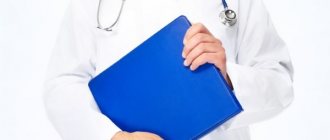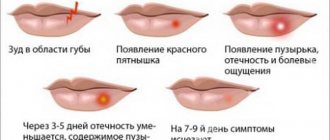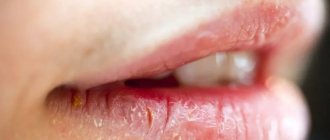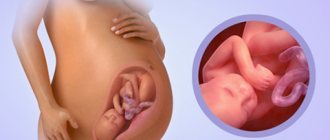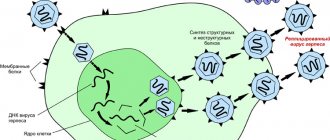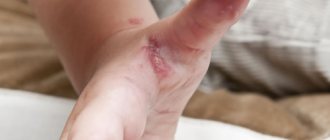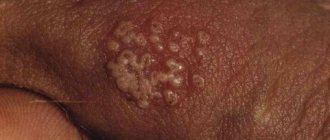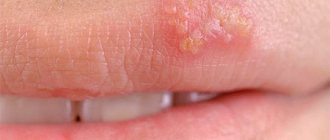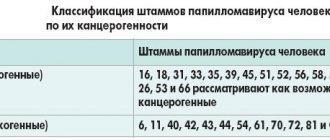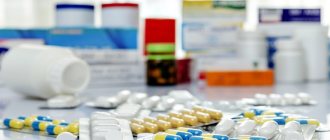There are frequent cases of herpetic rashes affecting the skin of various parts of the face, body and mucous membranes of organs. Herpes on the chin is rarely diagnosed, but its cause is the same type of herpes virus that provokes the development of an inflammatory process on the lips.
The cause of herpes on the chin is the same type of herpes virus that provokes the development of inflammation on the lips.
Symptoms
It may take more than a month from the moment of infection until the first signs of the disease appear.
Symptoms of herpes on the chin are as follows:
- The inflammatory process develops without a warning (prodromal) phase: a person does not experience the discomfort characteristic of the incubation period of herpes on the mucous membrane of the lips, which is due to the localization of the rash (the skin in the chin area is rough).
- Redness of the skin is observed. A herpetic rash appears on the chin, accompanied by severe itching. The bubbles increase in size over several hours.
- After a few days, the blisters containing the infected fluid burst.
- After 5-7 days, a crust will form, which will fall off over time, leaving no scars.
Headache is one of the symptoms of herpes on the chin.
Herpes on the chin can be characterized by a number of additional symptomatic signs:
- Increased body temperature.
- Enlarged lymph nodes under the lower jaw.
- Headache.
- Loss of appetite.
After the disappearance of external manifestations, the viral infection enters a latent state in the trigeminal ganglia.
Reasons for appearance
Characteristic rashes on the chin appear during the period of activation of the herpes virus type 1.
After infection, the infectious agent remains forever in the nerve cells. Exacerbations occur in the following cases:
- Susceptibility to colds.
- Hypothermia or excessive exposure to sunlight.
- Treatment with antibiotics.
- Weakened immunity.
- Avitaminosis.
- Premenstrual period.
- Chronic fatigue.
- Nervous exhaustion.
Herpes on the chin in men can be caused by mechanical damage to the skin during shaving.
Herpes on the chin in men can be caused by mechanical damage to the skin during shaving.
Activation of infection: possible causes
In order for a sore to appear on the chin, the body must encounter a provoking factor. In this case, the work of all organs and systems is aimed at neutralizing the potential danger, and the immune system ceases to restrain the replication (reproduction) and spread of the virus. As a result, colds appear on the lips and chin.
The disease can be provoked by:
- overwork – any stress inevitably affects the immune system;
- hypothermia;
- overheat;
- endocrine diseases - pimples most often accompany diabetes mellitus and thyroid pathologies;
- severe infections;
- pregnancy - during this period, immune activity decreases.
With simultaneous exposure to several provoking factors, the risk of exacerbation of herpes increases several times. A striking illustration is the disease that occurs in a child. This age category is characterized by the summer seasonality of the pathology, and colds and acne “reward” those who like to lie around in the hot sun all day long or sit until they turn blue in the face in a river or lake. The body tries to protect itself from the adverse effects of cold water or overheating, and solar ultraviolet radiation further suppresses the immune system.
As a result, characteristic changes quickly appear within a few hours - blisters filled with clear, rarely bloody fluid, which are very painful even when touched lightly.
Treatment of herpes on the chin
It is difficult to prevent the occurrence of blistering rash on the beard. But by following your doctor's recommendations, you can get rid of herpes in a short time.
Diagnostics
Laboratory examination includes a number of procedures.
The body of the IgG and IgM classes is detected during an enzyme immunoassay. Their indicators indicate the following:
| IgG - IgM - | There is a danger of primary infection. |
| IgG + IgM - | Repeated exacerbation is possible in conditions of weakened immune system. |
| IgG - IgM + | Indicate a primary episode of the disease. |
| IgG + IgM + | Indicate the development of a recurrent form of herpes. |
Then the type of viral infection is determined by PCR.
When making a diagnosis, it is also important to take into account the clinical picture of the disease.
During laboratory testing, the body of the IgG and IgM classes is detected during an enzyme immunoassay.
Pharmacy products
There are soft dosage forms for external treatment of vesicles on the chin and tablets for providing therapeutic effects at the cellular level.
The most common topical agents include:
- Acyclovir. Antiviral ointment is used to prevent the spread of infection to healthy areas of the skin. You can use analogues - Gerpevir and Zovirax.
- Panavir gel includes herbal components, therefore it is recommended for use by people with organic intolerance to the active ingredients of chemical-based antiviral ointments.
- Fenistil Pencivir is prescribed when virus resistance to acyclovir is detected.
Doctors recommend lubricating the affected area on the chin every 4 hours. The product must be applied with light movements along a trajectory from the edges to the center to avoid squeezing out the serous contents.
If the above remedies are ineffective, the doctor may prescribe antiviral drugs in tablet form:
- Acyclovir. When used simultaneously with an ointment of the same name, you can quickly cure an infection on the chin.
- Valaciclovir has a high rate of absorption of the active substance. There is no addiction syndrome.
Medicines containing acyclovir have a destructive effect on the membrane of herpes cells, inhibiting the growth of the number of virions (viral particles).
The exact dosage, frequency and time interval for taking the tablets is determined by the doctor, taking into account the nature of the disease and the physiological characteristics of the body.
Additionally, you need to use antiseptic agents for external treatment, especially at the stage of opening the bubbles. Zinc ointment has proven itself well. It has a drying, adsorbing, astringent effect, reduces the amount of fluid released during inflammation through the smallest defects of the epidermis.
The appearance of rashes on the chin indicates a violation of the body's protective function. Therefore, the doctor may prescribe a course of immunomodulators.
Folk remedies
Herpes on the chin can be cured at home:
- Grind 2 cloves of garlic until a paste-like consistency forms. Add ½ tsp to the resulting mass. honey and 5 ml of fir oil. It is recommended to apply the product in a thick layer to the affected area 3-4 times a day.
- Burn a piece of paper. Collect the brown liquid released during combustion. Take a fleshy aloe leaf. Clear the plant of thorns and skin. Cut in small pieces. Using gauze, squeeze out the juice (you will need 1 tsp). Add 2 drops of essential oil of any coniferous tree. Mix the ingredients thoroughly. Use the resulting product to lubricate the blistering rash in the chin area up to 6 times a day.
- Place 15 g of bee glue in alcohol (50 ml). Seal the container. Infuse the antiseptic solution for 7 days in a dark place, shaking daily. Strain. Use exclusively for external use.
- Lotions based on camphor alcohol are used to dry out weeping erosions.
- Grind dry calendula flowers, then 1 tsp. Mix the powder in equal proportions with Vaseline. Used externally to relieve pain.
- Earwax dries out chin sores, but it contains dust and dirt; To avoid bacterial infection, doctors recommend using a pharmacy version of sulfur ointment.
- To strengthen the immune system 1 tbsp. l. Echinacea pour boiling water in a volume of 1 liter. Simmer the broth over low heat for 15 minutes. Leave and strain. Use orally up to 7 times daily. The exact dosage and frequency of administration will be determined by your doctor.
Lotions based on camphor alcohol are used to dry out weeping erosions.
Traditional methods must be approved by a specialist. You cannot self-medicate.
Prevention
A diet will help prevent inflammation on the chin; you need:
- Reduce your consumption of baked goods and sweets.
- Eliminate spicy and fatty foods from your diet.
- Diversify the menu with seafood.
- Eat more fresh vegetables and fruits.
- To maintain healthy intestinal microflora, eat fermented milk products.
- Maintain a drinking regime (drink at least 1.5 liters of water per day).
To normalize the functioning of the body’s immune system you need:
- Exercise.
- Temper yourself.
- Eat and rest on time. 8 hours of sleep per night is important.
- Don't get too cold. Dress for the weather.
- Reduce sources of stress.
To normalize the functioning of the body's immune system, you need to exercise.
Treatment
If, apart from rashes and pain, herpes does not manifest itself with any other symptoms, it is not necessary to use special means for treatment, although it is useful. In this case, it will be enough to lubricate the rash with disinfectant solutions and prevent the spread of the virus from the bursting blisters to other parts of the body. To do this, zinc or oxolinic ointment should be applied to the rash areas from the periphery to the center, so as not to squeeze the liquid itself out of the bubbles beyond the treated areas.
Additionally, you can treat the same areas of rash with antiviral ointments: Acyclovir, Panavir, Zovirax, Vivorax. All of them are quite successful in inhibiting the multiplication of the virus in places of rashes, and when used at the very initial stages of the onset of symptoms, there is a chance of preventing the formation of ulcers in general.
It is important to remember that all of these ointments should not be used during pregnancy and breastfeeding, since in these cases their components can cause intoxication of the baby or affect the development of the fetus. It is not recommended to use these products on children.
There are, however, cases when herpes requires serious treatment. For example:
- the presence of serious generalized symptoms of infection - fever, nausea, headaches. If, upon examination of the patient, no other possible causes of such symptoms are found, a conclusion is drawn about a severe weakening of the immune system and the possibility of developing complications of herpes, including damage to the central nervous system;
- Confirmed immunodeficiency. With it, herpes, even if it does not cause dangerous complications, can lead to necrotic damage to the skin. However, its most dangerous consequences in such a situation are meningitis, meningoencephalitis, and inflammation of internal organs.
In both of these cases, the fight against herpes sores on the chin is carried out using special antiviral agents. Among them:
- Acyclovir tablets. Take 800 mg five times a day until the erosions crust over. As with the ointment, if you start using it at the earliest stages of relapse, you can avoid the development of the main symptoms;
- Valaciclovir, which is essentially a more active form of Acyclovir. Take it 1 mg three times a day until the ulcers heal;
- Famvir, based on another antiviral drug, Penciclovir, is more modern and capable of resisting a greater number of strains of the herpes virus. It is taken 500 mg three times a day.
All three of these drugs and their derivatives are contraindicated in pregnant women, nursing mothers and children. Only a doctor can decide on the possibility of using them in these cases.
Safer, but also less effective, are folk remedies for treating herpes - oils and extracts of herbs and berries, aloe and Kalanchoe juice, chamomile and echinacea decoctions, garlic, which is crushed and applied to rashes. However, such measures provide, at best, the effect of reducing symptoms, which, nevertheless, is required in most cases.
The child has
The appearance of symptoms in children indicates a weakened immune system. Children suffer from herpetic rashes on the chin due to overheating in the sun or hypothermia. In most cases, the skin of the chin is affected in the summer.
External signs appear as suddenly as in adults.
Areas of affected skin can be treated with antibacterial ointments. If the disease is accompanied by fever, the doctor may prescribe antipyretic drugs.
